
Agro-Value Chain Finance and Climate Adaptation: The role of the banking sector
Risk management is a core element of any business and this is no exception for the financial services industry, but the new risks and potential opportunities from climate change in particular are not typically taken into account.
The current lack of access to finance along agro-value chains constrains productivity and quality, resulting in limited economic returns and re-investment for all value chain actors, limited capacity for value addition and decreased ability to repay loans. However, awareness about climate risks is growing among financial institutions specifically, particularly in the insurance sector, and in the private sector more generally.
While the provision of agricultural finance that supports climate adaptation remains low, some successful models are emerging. For example, Centenary Rural Development Bank Ltd, one of the leading microfinance commercial banks in Uganda, is currently piloting a coffee credit scheme in Uganda. These models do not (yet) explicitly account for climate risks, but by improving access to finance at the farm level, they have the potential to reduce farmers’ vulnerability to shocks and stresses. They are often made possible through the rise of new information and communication technologies. The role of technology is expected to reduce financial transaction costs and improve access to inclusive financial services for farmers and other actors along value chains.
Limited access to financial resources is one of the key barriers to agro-value chain development and exacerbates the negative impacts of climate hazards. With an adequate enabling environment, improved access to finance can support climate adaptation along agro-value chains. The main assumption behind finance for climate adaptation along agro-value chains is relatively simple: improving value chain actors’ access to finance can help them build their assets and therefore reduce their vulnerability to climate and non-climate risks. However, access to climate-resilient and inclusive finance alone is not sufficient to support sustainable agro-value chain development in a changing climate. A combination of other factors is needed, calling for the support of the government and development partners.
To remain profitable and competitive, the banking sector needs to take a more proactive and holistic approach to climate risk management. Four actions are recommended. First, banks should explicitly integrate climate risk in their risk management strategies. Second, they should incentivize adaptation and climate-proof their financial instruments to support climate adaptation (or at a minimum to prevent maladaptation) along agro-value chains. Third, banks should explore any potential new opportunities from climate change by developing new products and services in collaboration with other actors (e.g., research organizations, telecommunication and software companies). Finally, a more proactive approach to supporting climate adaptation also calls for greater financial inclusion, including financial services that explicitly target women with a framework in place to monitor and evaluate progress and impacts.
Participating experts
You might also be interested in
How Small Businesses Can Support Climate-Resilient Value Chains: Lessons from Uganda
This brief focuses on investments by domestic seed companies in quality seeds, including climate-resilient varieties, in developing countries and the climate risk management benefits for other actors along the value chain. It is designed for researchers and practitioners working on agricultural value chains, food security and climate resilience in developing countries.
Promoting an Integrated Approach to Climate Adaptation: Lessons from the coffee value chain in Uganda
COP 29 Outcome Moves Needle on Finance
In the last hours of negotiations, concerted pressure from the most vulnerable developing countries resulted in an improved outcome on the finance target, with a decision to set a goal of at least USD 300 billion per year by 2035 for developing countries to advance their climate action.
What Is the NAP Assessment at COP 29, and Why Does It Matter?
At the 29th UN Climate Change Conference (COP 29) in Baku, countries will assess their progress in formulating and implementing their National Adaptation Plans. IISD’s adaptation experts Orville Grey and Jeffrey Qi explain what that means, and what’s at stake.